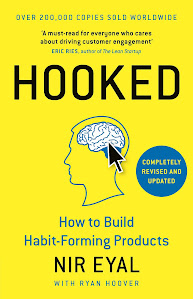Hooked: How to Build Habit-Forming Products by Nir Eyal
Nir Eyal's "Hooked: How to Build Habit-Forming Products" is more than just a guide for tech entrepreneurs. It's a thought-provoking exploration of the human psyche, examining how companies leverage our deepest desires and vulnerabilities to create products that stick. Eyal, a former tech insider, pulls back the curtain on the "Hook Model," a four-step framework that explains how products like Facebook, Instagram, and even exercise apps exploit our internal triggers, variable rewards, and desire for social connection to keep us coming back for more.
The book's strength lies in its accessibility. Eyal masterfully blends scientific research, real-world examples, and personal anecdotes to create a compelling narrative. He doesn't shy away from the ethical implications of his model, acknowledging the potential for manipulation and addiction. This self-awareness fosters a responsible approach, encouraging readers to consider both the benefits and drawbacks of building habit-forming products.
One of the most insightful aspects of "Hooked" is its exploration of the four core drives that motivate human behavior: the desire for achievement, power, connection, and novelty. Eyal explains how companies tap into these fundamental drives, creating cycles of anticipation, action, and reward that keep us hooked. For instance, the "like" button on social media feeds into our need for achievement and social validation, while the constant refreshing of news feeds exploits our desire for novelty.
The book delves into specific case studies, dissecting the tactics employed by popular products like Pinterest, Twitter, and Spotify. This approach makes the abstract concepts tangible, allowing readers to see the Hook Model in action. However, some might find the focus on tech-heavy examples limiting, as the principles could be applied to a broader range of industries and situations.
Despite its strengths, "Hooked" isn't without flaws. While the ethical considerations are appreciated, the book could benefit from a deeper exploration of the potential negative consequences of habit-forming products, particularly on mental health and well-being. Additionally, some might find the language a bit repetitive, especially when reiterating the four core drives and the Hook Model framework.
Overall, "Hooked" is a valuable read for anyone interested in understanding the psychology behind habit formation, especially in the digital age. It's a wake-up call for consumers, prompting them to be more mindful of how technology shapes their behavior. For entrepreneurs, it's a roadmap for designing products that resonate with users, but with a cautionary note to consider the ethical implications. Whether you're a tech enthusiast, a product designer, or simply someone curious about the human mind, "Hooked" offers a captivating and insightful journey into the world of habit and technology.




Comments
Post a Comment